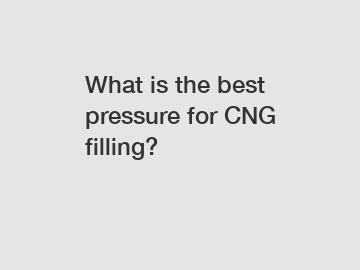What is the best pressure for CNG filling?
What is the best pressure for CNG filling?
CNG, or compressed natural gas, has gained popularity as a cleaner, more sustainable fuel alternative for vehicles. As more and more people consider switching to CNG, the question of the best pressure for CNG filling arises. Let's delve into this topic and explore the various aspects related to the pressure requirements for filling CNG.
1. Understanding CNG and Its Benefits:

CNG is a gaseous fuel composed mainly of methane. It is stored and compressed to reduce its volume, allowing for a greater amount of energy to be stored in a given space. Compared to traditional fuels like gasoline and diesel, CNG offers numerous advantages, such as lower emissions, reduced carbon footprint, and potentially lower running costs.
2. Role of Pressure in CNG Filling:
Pressure plays a significant role in the storage and utilization of CNG. When compressed, the gas occupies less space, allowing for efficient storage and transportation. When it comes to filling CNG in vehicles, the pressure determines the amount of gas that can be stored and ultimately used, influencing the vehicle's range.
3. Optimal Pressure for CNG Filling:
The best pressure for CNG filling depends on various factors, including safety, energy density, and the design of the automotive system. Generally, CNG stations worldwide deliver gas at pressures ranging between 200 bar (2,900 psi) and 250 bar (3,600 psi). These pressures strike a balance between achieving sufficient energy density and ensuring safe operations.
4. Safety Considerations:
Safety is of paramount importance when dealing with compressed gases. Higher pressures contribute to higher energy density, but they also pose increased safety risks. CNG storage tanks and fuel systems designed for vehicles are engineered and thoroughly tested to withstand the pressure required for safe usage. Therefore, it is crucial to adhere to recommended pressure guidelines to minimize the risk of accidents.
5. Vehicle Requirements:
Different vehicles have varying design specifications, including the type of CNG tanks they are equipped with. It is essential to consider the vehicle manufacturer's guidelines to determine the appropriate pressure for filling CNG. Adhering to these recommendations ensures optimal performance, efficiency, and safety.
6. Fueling Infrastructure:
The existing CNG fueling infrastructure also plays a role in determining the pressure for CNG filling. In regions where CNG is prevalent, the infrastructure is typically designed to deliver gas at a particular pressure range. Therefore, the best pressure for filling CNG may vary depending on the availability and compatibility with the fueling stations in a given area.
7. Local and International Standards:
Numerous local and international standards outline guidelines for CNG filling. These standards help ensure uniformity, safety, and compatibility across different regions and manufacturers. For instance, the ISO 16923 standard outlines recommendations for fueling CNG vehicles, including the pressure specifications. Adhering to these standards is essential for the proper functioning of CNG-powered vehicles.
8. Balancing Pressure and Range:
Finding the best pressure for CNG filling also involves considering the desired range of a vehicle. Higher pressures allow for more gas storage, thus increasing the range. However, excessive pressure can also reduce available space, impacting overall fueling capacity. It is crucial to strike a balance between pressure and range to achieve optimal fuel efficiency.
In conclusion, determining the best pressure for CNG filling involves balancing various factors like safety, energy density, vehicle requirements, infrastructure, and compliance with standards. While pressures ranging between 200 bar and 250 bar are commonly used, it is essential to consult vehicle manufacturer guidelines and adhere to local regulations. As CNG continues to gain traction as a sustainable fuel option, it is crucial to understand and optimize the pressure requirements for safe and efficient CNG filling.
Want more information on industrial Gas Storage Equipment, Industrial Gas Cylinder manufacturer, LNG Semi-trailer? Feel free to contact us.

Comments
0